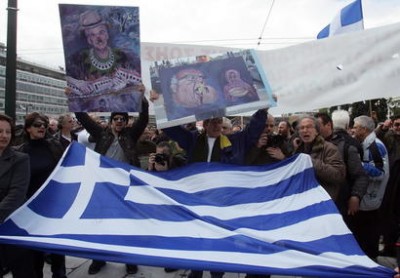Greek Parliament Approves Drastic Austerity Plan Amid Mass Strikes

Shortly after midnight on Thursday morning, the Greek Parliament voted in favor of the country’s fifth austerity program within the last three years. Voting in favor of the sweeping cutbacks were 153 deputies, with 128 voting against and 19 abstentions.
Earlier in the afternoon, more than a 100,000 angry workers marched through the rain to the parliament. They made clear they are no longer prepared to accept the poverty and misery bound up with more cuts. The police forcibly dispersed the protests using tear gas and stun grenades against demonstrators.
The powerful mass demonstration together with a two-day national strike were an expression of the strength of the Greek working class. City halls, offices and banks have been closed since Tuesday, and public transport was brought to a virtual standstill. Numerous private companies, such as waste management, were also hit by the strike action, and schools and universities remained closed.
Hospital and power plant workers as well as taxi drivers had already started strike action on Monday, prolonging their own walkout to three days. According to media reports, participation in the strike was overwhelming, with demonstrations also taking place in other Greek cities.
The two major trade union confederations, the public service union, GSEE, and the Civil Servants’ Confederation, ADEDY, had no perspective to offer. They reject the overthrow of the shaky coalition and a break with the European Union, which is dictating the austerity measures. The unions collaborate closely with the social democratic PASOK and other parties, which have imposed austerity over the past several years. PASOK is also a partner in the current government.
The trade unions therefore sought to limit the protests to a minimum. They had only called for a 48-hour strike in the first place to exert control over expanding industrial action all over the country and ensure that neither the adoption of the cuts nor the government itself were jeopardized. In order to guarantee that the strike inflicted as little damage as possible, they announced it long in advance, and strike action in sensitive areas such as air traffic, which has potentially huge consequences, was limited to a few hours.
The government demonstrated its determination to use authoritarian measures to impose austerity when shortly after 7 p.m. police began using tear gas, water cannon and stun grenades to drive protesters from Athens’ central square. Within minutes, the entire square was filled with choking fumes making breathing impossible without a gas mask. There was to be no disruption as deputies voted on the next package of cuts.
After police had cleared the area of protesters and prevented new demonstrations from assembling, the parliament passed the new austerity package at 12:30 a.m. The 300-page document had only been submitted to deputies on Monday evening.
The troika of the European Union, International Monetary Fund and European Central Bank had threatened not to pay the long overdue next installment of international aid should the package have been voted down. Without the troika payment, the government would be insolvent by mid-November.
Within the governing coalition of conservative Nea Dimokratia (ND), the social-democratic PASOK and the Democratic Left (DIMAR), seven deputies voted no and 19 abstained. They had previously stated that they agreed with the cuts, but objected to the changes proposed in labor laws. The abstentions made it possible for the government to obtain the majority necessary to pass both laws.
All of the opposition parties opposed the bill. In this respect, the role of the Coalition of the Alternative Left (SYRIZA) is especially ironic. It wants Greece to stay in the EU, and has no interest in bringing down the government.
As the largest opposition grouping, SYRIZA could have prevented the cuts by calling upon its deputies to resign en masse. The organization rejected this option, however, and assured the government of its support in this respect. It is only opposing the cuts because its votes change nothing in this situation. On many other occasions, SYRIZA has stressed it would guarantee the international debts to the banks and just wants to renegotiate their terms.
The latest austerity measures represent a substantial increase in the attacks taking place on all European workers and will serve as a model for new cuts in Spain, Portugal and across the continent.
The most recent austerity measures have already driven unemployment up to over 25 percent, slashed wages by up to 60 percent and led to the closure of 70,000, mostly small businesses. Mass poverty and hunger are commonplace today on the streets of Athens.
Now, in line with the latest package, a further 13.5 billion euro (US $17.2 billion) is to be cut. The plan is to destroy 150,000 jobs, reduce wages by up to 30 percent and slash pensions by between five and 15 percent. Additional cuts in the health care sector, which is already completely under-funded, total 1.5 billion euros. Similar cuts are on the agenda for the education system. Universities are to be shut down with massive reductions in teaching staff. The retirement age is to be raised from 65 to 67.
Further legislative changes adopted relate to labor law. Job protection statutes are to be watered down by reducing severance pay and payment deadlines. Layoffs are to be made easier, thereby driving up unemployment once again. In addition, the controversial merger of social security systems, rejected by a majority of parliamentarians last week, has simply been included in the legislative package and now adopted.
The cumulative effect of the succession of austerity measures will be to continue pushing Greece into the abyss. Previous cuts have already led to an enormous increase in the country’s debt burden, which will reach 189 percent of GDP this year. The country’s economy has shrunk by 21.5 percent since 2007, and another year of deep recession is predicted for 2013.

